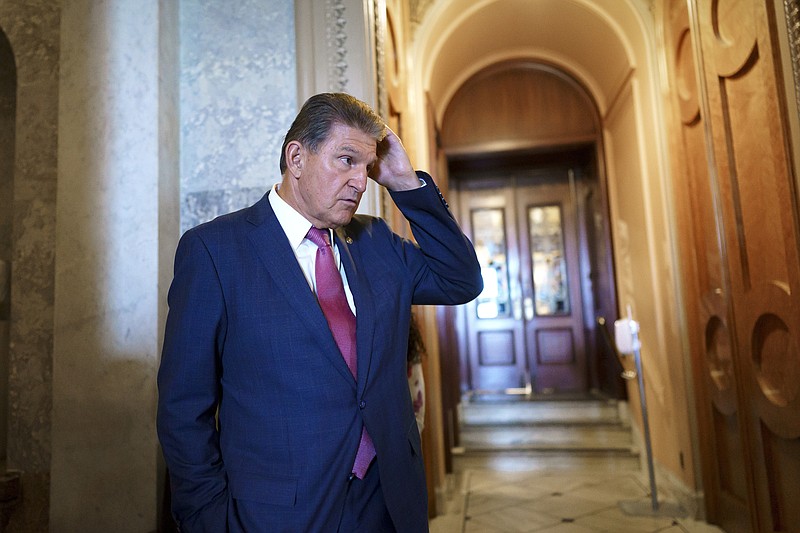WASHINGTON -- The Senate convened for a rare weekend session Saturday, with Majority Leader Charles Schumer, D-N.Y., encouraging the authors of a bipartisan infrastructure plan to finish writing their nearly $1 trillion bill so that senators can begin offering amendments.
But bipartisan negotiators failed to produce a bill by midday to allow an amendment process to begin.
[Video not showing up above? Click here to watch » https://www.youtube.com/watch?v=auXdQWf6KoU]
Several senators had predicted that the text of the bill would be ready for review late Friday or early Saturday, but it was not done when the Senate opened for business late in the morning. Nor was it ready when Schumer went to the floor in the early evening.
"I've been informed the group is working hard to bring this negotiation to a conclusion, but they need a little more time," Schumer said. "I'm prepared to give it to them."
Schumer said earlier in the day that he understood that completing the writing of such a large bill is a difficult project, but he warned that he was prepared to keep lawmakers in Washington for as long as it took to complete votes on both the bipartisan infrastructure plan and a budget blueprint that would allow the Senate to begin work later this year on a $3.5 trillion social, health and environmental bill.
"The longer it takes to finish, the longer we will be here, but we're going to get the job done," he said.
The legislation was formally put up for debate Friday, a milestone after weeks of stop-and-go negotiations. The 66-28 vote to move ahead reflected the broad bipartisan support for the plan in the evenly divided Senate.
Still, lawmakers weren't able to meet a self-imposed goal of finishing the text of the bill Friday afternoon, and there will be days of debate on amendments that will push a final vote on the legislation to late this week.
Senate passage of the infrastructure bill would set the stage for later consideration of a budget resolution that could facilitate the rest of Biden economic agenda, a $3.5 trillion overhaul of policies on climate change, taxes, health care, immigration and other Democratic Party priorities.
Under Senate rules, Democrats will be able to get that approved without Republican votes, if they can stay unified on the size and scope of the package. Budget Committee Chairman Bernie Sanders, I-Vt., said he anticipates the Senate will cancel the first week of its scheduled August recess to vote on it.
Schumer on Friday called the infrastructure package "a massive down payment toward rebuilding our nation's infrastructure."
"With the cooperation of our Republican colleagues, I believe we can finish the bipartisan infrastructure bill in a matter of days," Schumer said.
The legislation, which would mark the biggest investment in infrastructure in decades, was negotiated by the White House and a bipartisan group of senators led by Kyrsten Sinema, D-Ariz., and Rob Portman, R-Ohio.
The legislation includes $110 billion in new spending for roads and bridges, $73 billion of electric grid upgrades, $66 billion for rail and Amtrak, and $65 billion for broadband expansion. It also provides $55 billion for clean drinking water and $39 billion for transit, among other areas.
The legislation's supporters say its costs would be fully offset, in part by repurposing $200 billion in unspent covid-19 relief funds, sales from the Strategic Petroleum Reserve, higher customs user fees and more reporting requirements on cryptocurrency transactions. It also taps a number of budget gimmicks, like counting on revenue from future economic growth.
Several Republican senators, including Rick Scott of Florida and Ted Cruz of Texas, have blasted the measure's overall price tag and said they would oppose it. Sen. Bill Cassidy of Louisiana, one of the Republican negotiators, criticized the "inconsistency" of his colleagues who were all-in for former President Donald Trump's idea for a $1.5 trillion infrastructure plan but aren't supporting this package.
"If Republicans were on board for former President Trump, we are one-third the cost and have it paid for, it seems like something that should be acceptable," Cassidy said on Bloomberg TV.
In Friday's vote, the second procedural hurdle for the infrastructure plan this week, 16 Republicans -- including Minority Leader Mitch McConnell -- voted with all 50 senators who caucus with Democrats in favor of advancing the bill.
A half-dozen Republicans didn't vote: James Inhofe of Oklahoma, Rand Paul of Kentucky, James Risch of Idaho, Mike Rounds of South Dakota, Marco Rubio of Florida and Roger Marshall of Kansas. Risch had on Wednesday voted to advance the bill and Rounds supports the framework agreement.
Information for this article was contributed by Kevin Freking and Lisa Mascaro of The Associated Press and by Erik Wasson and Laura Litvan of Bloomberg News (TNS).



